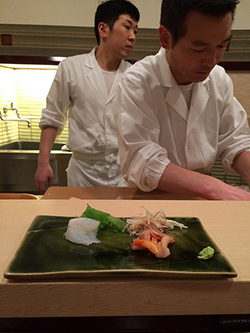Oct 08, 2015
Five Great Sushi Restaurants in Tokyo
 When you first arrived in Japan you were no doubt asked, possibly on a daily basis, “what Japanese food do you like?” and, knowing very little else, your reply would have likely been “sushi”. Of course Japanese food is varied and wondrous, but there is no doubt that sushi is king. But where should you go to get really good sushi? There are around 5,000 sushi restaurants in Tokyo alone and it’s tough to choose, particularly as taste in sushi often comes down to personal and individual preference. Below we have tried to compile an eclectic list of some of the best – known or otherwise – sushi bars in the capital.
When you first arrived in Japan you were no doubt asked, possibly on a daily basis, “what Japanese food do you like?” and, knowing very little else, your reply would have likely been “sushi”. Of course Japanese food is varied and wondrous, but there is no doubt that sushi is king. But where should you go to get really good sushi? There are around 5,000 sushi restaurants in Tokyo alone and it’s tough to choose, particularly as taste in sushi often comes down to personal and individual preference. Below we have tried to compile an eclectic list of some of the best – known or otherwise – sushi bars in the capital.
Sukiyabashi Jiro
Of course we couldn’t start the list without Sukiyakibashi Jiro, perhaps the most famous sushi restaurant in the world. Chef Jiro rose to international attention following the critically acclaimed documentary Jiro Dreams of Sushi, a movie that documented his quest to perfect the art of sushi. Despite not being held in quite the high regard by Japanese as it is by the foreign media, the three Michelin star restaurant is notoriously difficult to get a reservation thanks to the disparity between its immense popularity and limited seating spaces. As President Obama did when he visited with Prime Minister Abe, having a Japanese speaker with you is imperative.
- Where: 4-2-15 Ginza, Chuo
- Contact: www.sushi-jiro.jp
- Best point: It’s definitely something to tell the folks back home about!
Sushi Yoshitake
With just seven seats this three Michelin star restaurant is even smaller than Jiro’s, but it is perhaps even more popular for Japanese as the dining experience, at two hours, is around four times the length of its famous competitor. Despite being less traditional than most, with creative preparations of the like one would find in a high end French restaurant, Sushi Yoshitake is considered by some to be the perfect modern sushi dining experience. So popular is it, a six-seater branch has recently opened in Hong Kong
- Where: 3F Suzuryu Building, 8-7-19 Ginza, Tokyo
- Contact: www.sushi-yoshitake.com
- Best point: Chef Masahiro Yoshitake speaks a little English while serving you innovative sushi dishes.
Tsugu Sushimasa
As the name reflects, Tsugu Sushimasa is a family run restaurant handed down from generation to generation (‘tsugu’ means to inherit), and it is perhaps thanks to this that the tradition of sushi is held in such high regard. While most sushi bars prepare their rice with rice vinegar, or ‘shirozu’, here they use a red sake vinegar called ‘akazu’ that was the vinegar of choice during the Edo period, a time when sushi was becoming the dish we know today. While this adds a different aromatic hue to what you may be used to, it still tastes great. It tastes of history.
- Where: 8 Arakicho, Shinjuku-ku
- Contact: http://r.gnavi.co.jp/a0jadggy0000
- Best point: A time machine for the tongue.
Sushi Katsura
Just because most top places require a green-light from your bank manager before dining, great sushi doesn’t have to be expensive. Sushi Katsura is in the heart of the world famous Tsukiji fish market which means the seafood has gone from sea to plate in no time at all, but it is still relatively well priced. With dinner sets costing a reasonable 5,000 JPY per head, it is the lunch menu – 9 pieces of nigiri sushi and 1 maki sushi – costing just 950 JPY that will have your accountant nodding with approval. For those with a slightly bigger appetite, the 1.5 person set includes a further two extra pieces of nigiri sushi for an additional 100 JPY.
- Where: 2-15-4, Tsukiji, Chuo-ku
- Contact: http://www.sushi-katsura.jp/main_top.htm
- Best point: Fresh fish, great price.
Sushi Dai
Do you ever wake up with a hankering for fresh fish? If so, you can do no wrong in heading over to Sushi Dai for their breakfast sushi. Also in the Tsukiji fish market, the seafood at Sushi Dai is so fresh that sometimes you’ll find your morning meal still wriggling on the plate. But this is a good thing. Thanks to its location and opening times, this is the perfect place for breakfast after a morning sightseeing around the market. But don’t turn up desperately hungry, as queues can be up to two hours long, even at the crack of dawn.
- Where: 5-2-1 Tsukiji Tsukiji Fish Market 6th Bldg., Chuo-ku
- Contact: http://www.tsukijigourmet.or.jp/22_sushidai/
- Best point: Start the day the sushi way!
How to eat sushi
Worried that you may show yourself up when eating at one of these great places? Then check out this great video on how to eat sushi the ‘right’ way.
Mark Guthrie
Main photo: flickr.com “IMG_9367” by Jim & Claire (CC BY-SA 2.0) -Modified


About the author